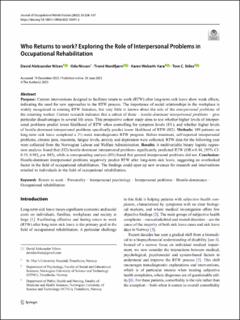| dc.contributor.author | Nilsen, David | |
| dc.contributor.author | Nissen, Oda | |
| dc.contributor.author | Nordfjærn, Trond | |
| dc.contributor.author | Hara, Karen Walseth | |
| dc.contributor.author | Stiles, Tore C | |
| dc.date.accessioned | 2023-11-20T07:39:09Z | |
| dc.date.available | 2023-11-20T07:39:09Z | |
| dc.date.created | 2022-12-20T19:02:31Z | |
| dc.date.issued | 2023 | |
| dc.identifier.issn | 1053-0487 | |
| dc.identifier.uri | https://hdl.handle.net/11250/3103434 | |
| dc.description.abstract | Purpose: Current interventions designed to facilitate return to work (RTW) after long-term sick leave show weak effects, indicating the need for new approaches to the RTW process. The importance of social relationships in the workplace is widely recognized in existing RTW literature, but very little is known about the role of the interpersonal problems of the returning worker. Current research indicates that a subset of these – hostile-dominant interpersonal problems – give particular disadvantages in several life areas. This prospective cohort study aims to test whether higher levels of interpersonal problems predict lower likelihood of RTW when controlling for symptom levels (H1); and whether higher levels of hostile-dominant interpersonal problems specifically predict lower likelihood of RTW (H2). Methods: 189 patients on long-term sick leave completed a 3½-week transdiagnostic RTW program. Before treatment, self-reported interpersonal problems, chronic pain, insomnia, fatigue levels, anxiety and depression were collected. RTW data for the following year were collected from the Norwegian Labour and Welfare Administration. Results: A multivariable binary logistic regression analysis found that (H2) hostile-dominant interpersonal problems significantly predicted RTW (OR = 0.44, [95% CI: 0.19, 0.98], p = .045), while a corresponding analysis (H1) found that general interpersonal problems did not. Conclusion: Hostile-dominant interpersonal problems negatively predict RTW after long-term sick leave, suggesting an overlooked factor in the field of occupational rehabilitation. The findings could open up new avenues for research and interventions entailed to individuals in the field of occupational rehabilitation. | en_US |
| dc.language.iso | eng | en_US |
| dc.publisher | Springer Nature Ltd. | en_US |
| dc.rights | Navngivelse 4.0 Internasjonal | * |
| dc.rights.uri | http://creativecommons.org/licenses/by/4.0/deed.no | * |
| dc.title | Who Returns to work? Exploring the Role of Interpersonal Problems in Occupational Rehabilitation | en_US |
| dc.title.alternative | Who Returns to work? Exploring the Role of Interpersonal Problems in Occupational Rehabilitation | en_US |
| dc.type | Peer reviewed | en_US |
| dc.type | Journal article | en_US |
| dc.description.version | publishedVersion | en_US |
| dc.source.pagenumber | 528–537 | en_US |
| dc.source.volume | 33 | en_US |
| dc.source.journal | Journal of occupational rehabilitation | en_US |
| dc.identifier.doi | 10.1007/s10926-022-10091-2 | |
| dc.identifier.cristin | 2095987 | |
| cristin.ispublished | true | |
| cristin.fulltext | original | |
| cristin.qualitycode | 1 | |

